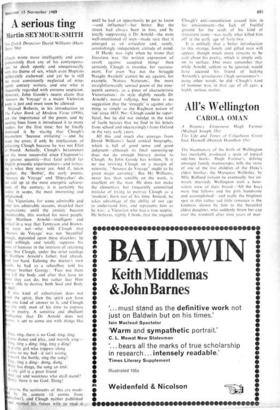A serious ting
Martin SEYMOUR-SMITH
Too Quick Despairer David Williams (Hart- Davis 50s)
clouch wrote more intelligently and com- prehensively than any of his contempora- ries: he dealt openly and unequivocally with the theme of sex, which even Hopkins deliberately eschewed; and yet he is still the most consistently neglected of nine- teenth century writers, and one who is frequently regarded with extreme suspicion. However, John Goode's recent claim that 'Amours de Voyage' is a major Victorian poem is just and must soon be allowed. Michael Roberts, in his introduction to The Faber Book of Modern Verse (1936), saw the importance of the poem, and by quoting lines from it introduced it to many readers for the first time: but he finally dismissed it by stating that Clough's hexameters 'become irritating' — and he made the error, if only by implication, of criticising Clough because he was not Eliot or Pound. Actually, Clough's hexameters are the most successful since Chapman's: he ignores quantity—that fatal pitfall for English prosodic experimenters—and irritat- ng is what they never are. And if, taken together, the 'Bothie', the early poems, 'Amours de Voyage' and Dipsychus'• do not add up to the most energetic achieve- ment of the century, it is certainly the widest in scope, the most interesting and enlightened.
The Victorians, for some admirable and other less admirable reasons, shackled their imaginations; until the anxiety became unendurable, this worked for most people. Even Matthew Arnold—intelligent and critical in a way that Tennyson and Brown- ing were not—who told Clow.th that 'Amours de Voyage' was not 'beautiful' nough, depended upon these shackles: he odd willingly and totally suppress his etwe of humour in the interests of retaining hem. But Clough, under the strict tutelage Matthew Arnold's father, had already ried too hard. Echoing the doctor's own ords. he had as a schoolboy told his ounger brother Georgy: 'Fear not them hat kill the body and after that have no ore they can do, but rather fear Him ho is able to destroy both Soul and Body Hell'.
II this kind of exhortation does not ush the spirit, then the spirit can have ly one kind of answer to it, and Clough as the only man of his time to express s In poetry. A sensitive and ebullient elligence that Dr Arnold does not stroy S:
Ting, ting, there is no God: ting. ting:
Come dance and play, and merrily sing—
Ting. ting a ding; ting, ting a ding! 0 pretty girl who trippest along Come to my bed—it isn't wrong. Uncork the bottle, sing the song! Ting. ting a ding: dong, dong. Wine has dregs, the song an end: A silly girl is a poor friend And age and weakness who shall mend? Dung, there is no God; Dong!
course, the sentiments of this are modi- by its context (it comes from Pschus'), and Clough neither published nor Wanted his future wife to read it is apt to come out with things like - until he had an opportunity to get to know —and influence?—her better. But the streak had always been in him, and by totally suppressing it Dr Arnold—the most well-intentioned of men—made sure that it emerged as an articulate and, surely, astonishingly independent attitude of mind.
If Hardy was right when he wrote that literature was 'the written expression of revolt against accepted things' then certainly Clough is overdue for reassess- ment. For even 'Say not the Struggle Naught Availeth cannot be set against, for example, Natura Naturans', the most straightforwardly sensual poem of the nine- teenth century, as a piece of characteristic Victorianism: its style slightly recalls Dr Arnold's moral rallying, but there is no suggestion that the 'struggle' is against any- thing as simple as the Rugbean notion of 'sin' circa 1835. No: Clough could be super- ficial, but he did not indulge in the kind of facile heroics that we find in his letters from school and (decreasingly) from Oxford in the very early years.
All this and much else emerges from David Williams's lucid critical biography, which is full of good sense and good judgment—although its final summing-up does not do enough literary justice to Clough. As John Goode has written, 'It is no use reviving Clough on a margin of minority. "Amours de Voyage" ought to be given major currency'. But Mr Williams, never less than sensible on the work, is excellent on the man. He does not make the elementary but frequently committed mistake of trying to portray Clough as a 'modern', born out of his time. Instead, he takes advantage of the ability of our age to understand him, and represents him as he was: a Victorian who was a true sceptic. He believes, rightly I think, that the anguish Clough's anti-romanticism caused him in his environment—the lack of fruitful ground for the seeds of his kind of irreverent irony—was really what killed him off at the early age of forty-two.
It is unlikely that a better introduction to this strange, lonely and gifted man will appear, though much more remains to be said about his poetry, which is simple only on its surface. One must remember that while Arnold, seldom to be ignored, would have accused his friend of lacking Aristotle's spondaiotes (*high seriousness')— using other words, he did--Clough's kind of humour was, in that age of all ages, a highly serious matter.






































 Previous page
Previous page